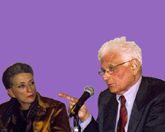In the latter half of the twentieth century, theorists began to see writing as the primary location of the construction and representation of subjectivity. French theorist Hélène Cixous argued for the potential existence of ecriture feminine as one possible path of resistance to the phallogocentrism of a masculinist subjectivity. For Cixous, ecriture feminine works to blur the self/other dichotomy. It erases the border between writer and reader, and both become forms of inscription of meaning. Ecriture feminine comes from the body, not just the mind.
